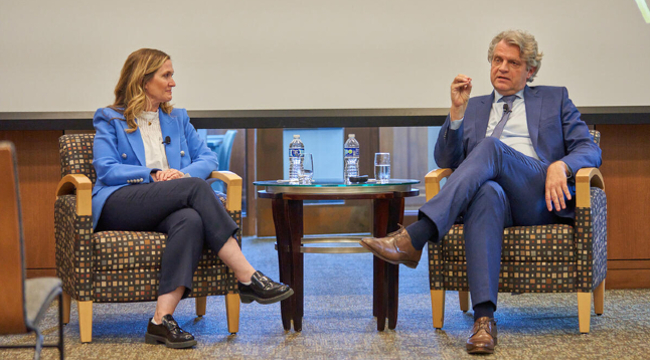
Vanderbilt University Chancellor Daniel Diermeier shared insights from his research on corporate reputation and public perception during an event hosted by the Jean and Alexander Heard Libraries on April 26. In his latest book, Reputation Analytics: Public Opinion for Companies (University of Chicago Press, 2023), Diermeier incorporates lessons from a variety of fields, including game theory, psychology and text analytics, to create a methodology for understanding and managing the reputations of organizations.
“The first basic idea is that corporate reputation is public opinion for companies … ,” Diermeier told the audience in the Central Library Community Room. “It’s not what the company thinks. It’s what people think. It’s about attitudes and beliefs that the public have.”
Public opinion can be a key determining factor in an organization’s successes and in its failures, Diermeier explained. Importantly, opinions are not stored in a “mental database or file drawer,” as most people assume, but rather are constructed on the spot by retrieving associations stored in long-term memory, which are affected by emotions and the immediacy and vividness of the details.
“When you have reputational crises, the problem is that people pay attention for a very short time,” he said. “But during that time they encode memories. … They’re not for forever, but they can be there for a very long time, especially if they’re very vivid. So, when I worked with companies, I always told them, ‘You’ve got to [address it] within the first 24 hours.’ … During the first 24 hours, people form impressions, and that’s encoded in the memory. And that’s hard to change.”
The April 26 event, which was introduced by University Librarian Jon Shaw, featured a discussion between Diermeier and moderator Kelly Goldsmith, E. Bronson Ingram Professor of Marketing at the Owen Graduate School of Management. Diermeier and Goldsmith covered a range of topics, from how to weigh reputational risks against excessive risk aversion to navigating conflicting opinions in today’s politically polarized environment.
“I think there’s a bit of a naivete among corporate leaders,” Diermeier told Goldsmith. “[They think] you just have to speak from the heart, and then everything will be OK. Well, that’s not going to happen, especially in an environment of high polarization that we have right now. Providing more subtlety and more tools, grounded in rigorous research, is what I’m trying to do.”
Earlier in April, the Owen School hosted Diermeier for a conversation about his research, moderated by Rangaraj Ramanujam, Richard M. and Betty Ruth Miller Professor of Healthcare Management and professor of health policy. Among the questions Ramanujam asked was how organizations can be more proactive in managing their reputations beyond simply trying to prevent crises.
“So, there are really two pieces to this,” Diermeier responded. “One is crisis management, and the other is risk management. That’s the way I think of all the crises that we spent a lot of time talking about. Because the risk management problem is: How do you think about reputational risk in the right way? … Reputational risk is an amplifier for other risks that you do. So, if a company has to restate its earnings, that’s a financial risk because it may increase their cost of capital, but it’s also a reputational risk … .”
In his closing remarks at the Owen event, Diermeier explained why he wrote Reputation Analytics and why more research on the topic is needed.
“I think this is a very important aspect of management, but it’s dramatically understudied,” he said. “… I want this to be the first book on the subject that is rigorous, and then hopefully other researchers will build on that.”
Learn more about Chancellor Daniel Diermeier and his research.


